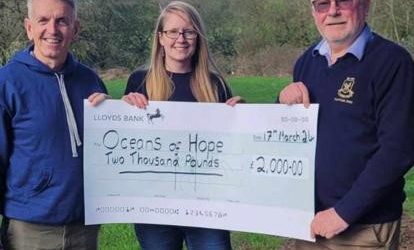Oceans of Hope Research Project


Next year we will expand our Oceans of Hope research programme to include Oceans of Hope Challenge activities. Founder of Oceans of Hope, Dr Mikkel Anthonisen, explains the motivation for and concept behind this research initiative.
“Next year, in 2023, it is 10 years since I announced that I was going to sail around the world in a sailboat with a crew of people with MS. And we did! From June 2014 until November 2015, we completed a global circumnavigation with a shifting crew of people with MS, from 16 different countries.
I wanted to change the perception of MS and what it is like to live with a chronic and disabling disease. To show the world that we can still do it! I am a medical doctor, specialised in MS, I don´t live with MS myself, yet I see MS as a condition that in its essence is common to all mankind – we do not know what tomorrow brings. We are not in control of the most important things in our lives such as disease and health, love, meaning and the feeling of belonging. I deeply feel that we are all worthy of belonging to a strong and caring community where we can grow and give to others, and this we are in control of! We can create communities where people can thrive, be challenged, and discover a stronger version of themselves in spite of, and because of, accepting our vulnerability. This has been my motivation since the dawn of Oceans of Hope.
When we set off to sail around the globe, we had great expectations of the adventure lying ahead of us, but never had I expected the vast impact on people´s lives that Oceans of Hope would come to have. This was almost too good to be true and definitely deserved to be shared with a broader audience. After returning from the circumnavigation, and in collaboration with MS Australia and Monash University, Melbourne, we conducted an analysis of all the blogs written during our journey around the globe. As a result of the study four major themes were identified: (1) the challenges of the journey; (2) teamwork and camaraderie that arose from sharing a diagnosis in common; (3) reframing mindsets as people acknowledged and adjusted to their diagnosis; and (4) empowerment and personal growth with hope rediscovered.
The conclusion of the study was as follows: “Numerous psychosocial benefits are achievable when individuals with multiple sclerosis are provided with opportunities and support to challenge themselves. Implications for Rehabilitation: A diagnosis of multiple sclerosis does not necessarily have to mean a sedentary lifestyle and social isolation. Psychological adjustment to a diagnosis of multiple sclerosis, changes in mindset, and rediscovering hope and optimism can be achieved by adventurous means outside clinical settings. We encourage clinicians, policy makers, and funding bodies to think ‘outside the box’ when developing and supporting programs for individuals living with chronic illnesses.” Here is a link to the article about the study published Disability & Rehabilitation, Volume 42, 2020: I can do more than I thought I could.
In the wake of the Monash study, Associated Professor, Sailor and Olympic medalist, Jens Bojsen-Moeller and I initiated a more comprehensive pilot study to be conducted in 2019 and 2021 (supported by Trigon Fonden). It is from these results that we in the Oceans of Hope research team are putting together a package of questionnaires to be launched in 2023.
Since we came home from around the world our mothership, S/Y Oceans of Hope, has been sailing on tours every summer. And thanks to the initiative of Robert Munns, who himself participated in the Oceans of Hope around the world tour, Oceans of Hope Challenges were launched in 2016 and the programme has since expanded to help hundreds of people with MS to come sailing with us. The same impact has been generated; Overcoming challenges together; belonging to a strong community; reframing one´s mindset (yes, I can do more than I thought I could!) and empowering people with MS with personal growth and rediscovery of hope.
We hope that you will embrace the Oceans of Hope research project and support us in our efforts to “encourage clinicians, policy makers and funding bodies to think `outside the box´ when developing and supporting programs for individuals living with chronic illnesses” to quote the final conclusion of the study from Monash University.
See you all aboard!
We hope that you will embrace the Oceans of Hope research project and support us in our efforts to “encourage clinicians, policy makers and funding bodies to think `outside the box´ when developing and supporting programs for individuals living with chronic illnesses” to quote the final conclusion of the study from Monash University.
Founder of Oceans of Hope, Dr Mikkel Anthonisen
More articles

‘Sail the Solent’ Challenge
FIND OUT MORE
Fabulous Fundraising from Peter, Liz, Sam and Ashbourne Golf Club
FIND OUT MORE

